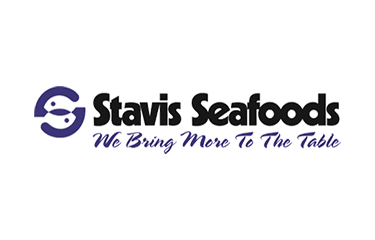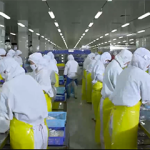The Top 25: Stavis Seafoods Q&A

Stavis Seafoods is featured in The Top 25: Sustainability & Conservation list, published by SeafoodSource on 24 September, 2020.
SeafoodSource: What kind of trends have informed Stavis Seafoods’ latest sustainability/conservation efforts?
Stavis Seafoods: We are seeing three specific trends that have informed some of our recent efforts regarding sustainability. The first is a move by the industry towards better and more uniform sustainability information. Guided by the Global Dialogue on Seafood Traceability 1.0 standard, the seafood industry is finally seeing the need for everyone to be "on the same page" regarding sustainability. Stavis signed on to participate in the new GDST 1.0 standard in March, 2020.
The second trend is a noticeable increase in fishery improvement projects (FIPs) around the world as well as the rise of supplier roundtables, which aggregate fishery improvement projects in "like" species. Our Chief Sustainability Officer Richard Stavis became the first industry chair for the SFP Squid Supplier Roundtable earlier this year. Stavis Seafoods is also a board member of the National Fisheries Institute’s Crab Council and an active participant in numerous fishery improvement projects. It is also a founding board member of SeaPact and the Boston Fisheries Foundation, organizations both committed to protecting the future of our oceans. We will continue to look for opportunities to participate and drive roundtables and FIPs whenever possible.
Finally, there is a greater awareness of and an increase in the number of tools designed to detect risk in labor conditions in the seafood supply chain. For years, Stavis has touted social responsibility as a key to true seafood sustainability and the industry seems to be following that path as well. Stavis is currently utilizing some of these tools to protect the workers in its supply chain and on its worldwide fleet of vessels.
SeafoodSource: What key features serve to set Stavis Seafoods’ sustainable seafood offerings apart in the market?
Stavis Seafoods: We have two key features that set our sustainability efforts apart in the market. The first is our vertical integration capabilities. Stavis Seafoods’ parent company is the Profand Group, a multinational fishing and seafood manufacturer with vessels and processing plants around the world. This relationship provides Stavis Seafoods with a direct connection to fishermen and creates a simple, hook-to-plate sourcing solution. The relationship provides customers with seafood sourced directly from vessels and plants under common ownership. We have boots on the boats actually harvesting the seafood ourselves! This gives us more direct access to wild-caught, sustainable seafood worldwide as well as unparalleled value-chain visibility and traceability – both keys to effective seafood sustainability. This extended supply chain visibility and larger international reach gives us more access to sustainable opportunities and products from around the world.
The second differentiator is our SeaTru brand, a dedicated sustainable seafood brand focused on traceability and social responsibility. We don’t just talk the talk about responsible seafood, we walk the walk. Every SeaTru product must be sourced from a sustainably certified, ranked or domestic fishery or a fishery involved in a comprehensive improvement project. Every fishery must also be certified or independently audited to ensure it complies with U.S. Department of Labor standards and any products in the brand must be completely traceable from harvest to plate with documentation proving it. We then explain how each product meets that criteria with our SeaTru Report Card, available on our website and to any customer. We believe these in-depth brand standards ensure that SeaTru seafood is truly traceable, responsible, and sustainable. No other seafood brand goes to that level of complexity to prove the value of its sustainability claims.
SeafoodSource: How does sustainability factor into your overall mission and strategy as a business?
Stavis Seafoods: We not only believe sustainability is a key part of our corporate strategy, it is essential for the future of the industry. As a company that relies on healthy oceans, our goal has always been to protect our natural resources and the future of our food supplies. We are also dedicated to educating customers regarding sustainability options and customizing our service to meet their sustainability goals. We are one of the leading voices regarding sustainability in the industry, helping shape its future and define its role. We are also committed to continually improving our sustainability profile and constantly review and assess our sourcing to provide a wide range of sustainable seafood options.
As part of that strategy, Seafoods has included concepts like traceability and social responsibility in its definition of sustainability for years. At Stavis, we define sustainability as not only sourcing seafood with a low environmental impact but in a manner that allows for continued use by future generations, protects the rights of fishermen and supports the communities from where it is sourced as well. This requires a multi-faceted approach to sustainability which includes an approach to wild-caught and farmed-raised seafood, as well as ensuring traceability and social responsibility.
The following highlights our current commitments in those areas:
- Wild seafood – Stavis Seafoods offers a growing range of wild-caught products that are certified sustainable within the chain of custody of the Marine Stewardship Council (MSC). We also clearly communicate Monterey Bay Seafood Watch’s rankings when available, as well as information from other recognized sustainability ranking organizations, such as Ocean Wise. Stavis recognizes the Global Seafood Stewardship Initiative (GSSI) benchmarked certification programs and is fully invested in the fishery improvement project (FIP) approach to improving wild fisheries. Stavis is also an active member of the National Fisheries Institute’s Sustainable Crab Council, which funds FIPs for Blue Swimming Crab in six countries.
- Farmed seafood – Stavis Seafoods evaluates each aquaculture endeavor based on risk. We work with each producer to ensure that products grown with added feed are certified sustainable and can communicate information to customers regarding the Aquaculture Stewardship Council (ASC), Best Aquaculture Practices (BAP), and GlobalG.A.P. certification products that we offer. Stavis is also a supporter of a number of aquaculture improvement projects (AIPs).
- Traceability – Stavis Seafoods is compliant with federal “one up, one down” traceability regulations and captures its complete Seafood Import and Monitoring Program (SIMP) records from the beach to our point of distribution. Stavis has signed the adoption statement for the Global Dialogue on Seafood Traceability 1.0 standard, a series of key data elements and a standard language designed to allow all members of the supply chain to communicate essential traceability information throughout the chain.
- Social responsibility – Stavis Seafoods is committed to providing customers with honestly-harvested seafood options that help support seafood communities around the world. Stavis has documented the status and other labor related aspects of all those employed on its company-owned vessels. Stavis also screens importers by country, using the standards developed by the U.S. Department of Labor to determine any risk of forced labor and/or child labor in the seafood supply chain. If we source from a company in an "at-risk" country, we require that company to undergo a secondary risk screening to ensure our social responsibility standards are met.







Share